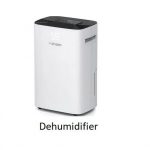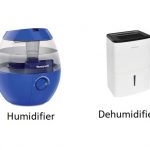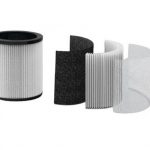Does an Air Purifier Use A Lot Of Electricity?
Air purifiers play a great role in maintaining good indoor air quality. Like any other home appliance, air purifiers also use electricity to operate. Given that they need to run 24/7 for effective purification, it might be worrying, especially from an electricity bill perspective. Because of this those who want to acquire air purifiers ask themselves questions like “does air purifier use a lot of electricity?”
If you are also asking yourself the same question or you want to understand air purifier consumption rate, we can help you out. In this article, we discuss how air purifiers consume electricity.
How Much Electricity Do Air Purifiers Consume?
On average, air purifiers consume between 40W-200W depending on the model. However, you should note that there are several factors that influence an air purifier’s electricity use. Because of these factors, some air purifiers consume less electricity than others.
Before we discuss these factors, let us first learn how to calculate air purifier electricity consumption.
Take an example of Levoit Vital 100 air purifier.
This air purifier consumes 55W
Assuming it runs 24 hours
= 55x24 hours
=1320W
This is the consumption rate of Vital 100 per day
Now we have to convert watts into kWh and this is done by dividing the number by 1000.
=1320W/ 1000
=1.32 kWh per day
Assuming your unit runs 24/7 for a whole month
= 1.32x30
= 39.6 kWh per month
To determine how much you can pay for 39.6 KWh on your monthly bill, we have to multiply the kWh with the electricity rate.
Assuming the electricity rate in your area is 13 cents per KWh
= 39.6x13
= 514.8 cents
Your monthly bill for Levoit Vital 100 = $5.18
Therefore, to determine your air purifier energy consumption, you can follow the above procedure. Endeavor to use the air purifier power rating indicated on your unit.
Factors That Determine Air Purifier Electricity Consumption
- Watt Rating
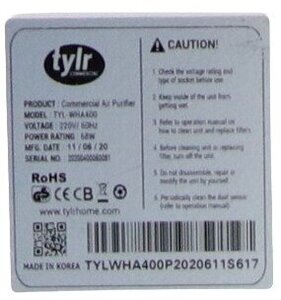
The watt rating can help you determine whether your air purifier consumes less or more electricity. Most air purifiers have a maximum wattage of about 40W-200W. As indicated above, the wattage rating on your air purifier shows the air purifiers consumption at its highest speed setting. So, this means your air purifier electricity consumption can be less than the indicated wattage if running at a low or medium speed.
You can find the watt rating at the back or the bottom face of your air purifier.
- Area Coverage
The more space an air purifier covers, the more energy it consumes. When an air purifier is purifying a large space, it uses a lot more electricity compared to those covering a smaller area.
- Auto Mode
Air purifiers with an auto mode feature essentially consume less electricity than those without it. When this feature is enabled, an air purifier works only when there are detected pollutants. This means when there are no airborne impurities, your air purifier will be off. Contrary to other air purifiers that run continuously regardless of the presence of pollutants.
- Filtration Levels
Air purifiers come with different filtration levels ranging from 2 to 6 filters. Depending on the number of filters, an air purifier may use less or more electricity. In general, air purifiers with many filters use more energy than those with fewer filters.
How Do Air Purifier Energy Consumption Fair With Other Home Appliances
The comparison table below entails some of the commonly used home appliances.
| Appliance | Watts Range |
| Air Purifier | 40-200 |
| Laptop | 50 |
| Refrigerator | 725 |
| Air Conditioner | 3000-5000 |
| Water Heater | 4500-5500 |
| Clothes Washer | 350 - 500 |
| Clothes Dryer | 1800-5000 |
| Dishwasher | 1200 -2400 |
| Flat Screen TV | 120 |
| Fan - ceiling | 65 - 175 |
| Fan - furnace | 750 |
| Dehumidifier | 785 |
| Coffee Maker | 900 - 1200 |
| Microwave Oven | 750 - 1100 |
| Vacuum Cleaner | 1000 - 1440 |
| Clothes Iron | 1000 - 1800 |
This information is from the Energy Conservation for Environmental Protection Website.
With the above information, it is evident that air purifiers consume less energy. Only laptops and a flat-screen TV can consume less energy than an air purifier running at a maximum speed.
Our Take
Air purifiers do not use a lot of electricity. Even if it runs for 24 hours consistently for the whole month, your electricity bills will not be that scary. As discussed above, a 55W air purifier running for 30 days will add around $5 to your monthly electricity bill.
Even if you are using a 200W air purifier, your bills will not increase as much as when you use a refrigerator or dishwasher.
In fact, if you purchase a good air purifier, you may not fill the impact of running the unit for the whole day. Therefore, a good air purifier does not consume a lot of electricity.
How To Choose A good and Energy Efficient Air Purifier
- Energy Star Certified
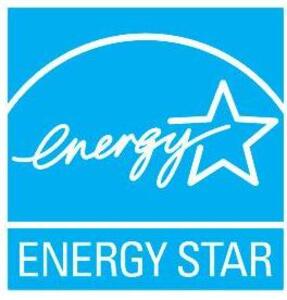
When looking for an air purifier, you need to ensure whatever model you choose is energy certified. According to Energy Star, a certified air purifier can be over 25% more energy efficient than other ordinary models. Ultimately, this can help you breathe clean air without significantly impacting your electricity bills.
- Auto Mode
As discussed above, an auto mode feature can help minimize the air purifier energy consumption. This is because an auto mode feature allows the air purifier to work only when necessary. Generally, when there are no pollutants, the air purifier will stop and start when pollutants are detected.
Summary
In brief, air purifiers do not consume a lot of electricity. They actually consume less electricity compared to most home appliances. However, there are some air purifiers that may consume more than expected. In this case, it is up to consumers to determine which air purifier consumes less and how much it takes per day or month.
We have shared how you can calculate your air purifier energy consumption. Basically, you can use this calculation guide to determine how much your air purifier consumes. Besides, when buying an air purifier ensure it is energy star certified or it has an auto mode feature.
Featured Posts
Latest Posts
- 5 Best Humidifier For COPD
- 5 Best Humidifiers For Greenhouse
- 5 Best Humidifiers For Electric Heat
- 5 Best Humidifiers For Pregnant Women
- 5 Best Humidifiers For Yoga Studio
- 5 Best Humidifiers For Eczema
- 5 Best Air Purifiers with Permanent Filters
- 5 Best Air Purifier With A Humidifier
- 5 Best Air Purifiers For Resin Printing
- 5 Best Air Purifiers for Eczema
- 5 Best Air Purifier With Fan Combo
- 5 Best Air Purifier For Lung Disease
- 5 Best Humidifiers For Essential Oils
- 5 Best Humidifiers for Elderly
- 5 Best Humidifiers For Lash Extensions
- 5 Best Humidifiers For Cough
- 5 Best Humidifiers For Fireplace
- 5 Best Humidifiers for Humidor
- 5 Best Humidifiers For Pets
- 5 Best Humidifiers For Weed
